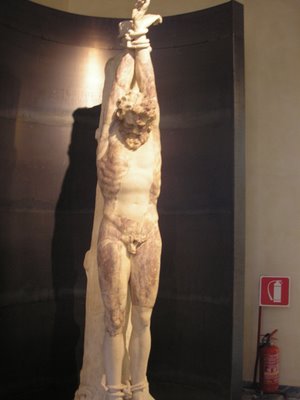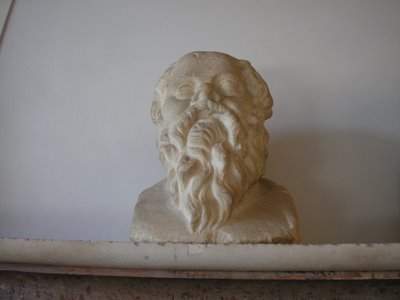A Post for Mr. Coke
Our largely reticent co-blogger mentioned in the title to this post is a great enthusiast of Plato and his caprine leading man Socrates. In Symposium 215a and following, we find Alcibiades comparing Socrates to Marsyas:
“The way I shall take, gentlemen, in my praise of Socrates, is by similitudes. Probably he will think I do this for derision; but I choose my similitude for the sake of truth, not of ridicule. For I say [215b] he is likest to the Silenus-figures that sit in the statuaries' shops; those, I mean, which our craftsmen make with pipes or flutes in their hands: when their two halves are pulled open, they are found to contain images of gods. And I further suggest that he resembles the satyr Marsyas. Now, as to your likeness, Socrates, to these in figure, I do not suppose even you yourself will dispute it; but I have next to tell you that you are like them in every other respect. You are a fleering fellow, eh? If you will not confess it, I have witnesses at hand. Are you not a piper? [215c] Why, yes, and a far more marvellous one than the satyr. His lips indeed had power to entrance mankind by means of instruments; a thing still possible today for anyone who can pipe his tunes: for the music of Olympus' flute belonged, I may tell you, to Marsyas his teacher. So that if anyone, whether a fine flute-player or paltry flute-girl, can but flute his tunes, they have no equal for exciting a ravishment, and will indicate by the divinity that is in them who are apt recipients of the deities and their sanctifications. You differ from him in one point only--that you produce the same effect with simple prose unaided by instruments. For example, when we hear any other person--[215d] quite an excellent orator, perhaps--pronouncing one of the usual discourses, no one, I venture to say, cares a jot; but so soon as we hear you, or your discourses in the mouth of another,--though such person be ever so poor a speaker, and whether the hearer be a woman or a man or a youngster--we are all astounded and entranced. As for myself, gentlemen, were it not that I might appear to be absolutely tipsy, I would have affirmed on oath all the strange effects I personally have felt from his words, and still feel even now. For when I hear him [215e] I am worse than any wild fanatic; I find my heart leaping and my tears gushing forth at the sound of his speech, and I see great numbers of other people having the same experience. When I listened to Pericles and other skilled orators I thought them eloquent, but I never felt anything like this; my spirit was not left in a tumult and had not to complain of my being in the condition of a common slave: whereas the influence of our Marsyas here has often thrown me into such a state [216a] that I thought my life not worth living on these terms. In all this, Socrates, there is nothing that you can call untrue. Even now I am still conscious that if I consented to lend him my ear, I could not resist him, but would have the same feeling again. For he compels me to admit that, sorely deficient as I am, I neglect myself while I attend to the affairs of Athens. So I withhold my ears perforce as from the Sirens, and make off as fast as I can, for fear I should go on sitting beside him till old age was upon me."
While at the Capitoline the other day, I got pictures of a sculpture of the flaying of Maryas and another of Socrates' head. Take a look at them and compare (sorry, I know the face of Marsyas is difficult to see at that angle). Is Alcibiades right? Does Socrates look like a satyr? Or is he telling a fib?




No comments:
Post a Comment